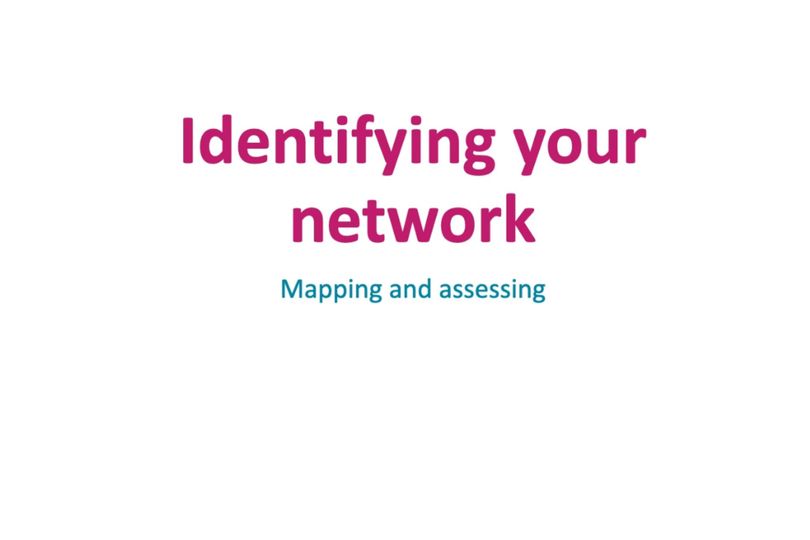This section encourages you to take a strategic look at your network. Are there areas you can build on or particular gaps which you’d like to fill?
Identifying your network
Get a paper and pen and do this short mapping exercise to help you set some goals for your own networking.
Be patient: The timing is always key: it doesn't mean that you meet somebody today, and you have exchanged contact details, that this collaboration has to materialize today. It may mature in two years, and that may be even better. So patience is key in all of this but putting yourself out there introducing yourself who you are, what do you do and, you know, just keeping in touch is extremely important.
- Maria Papathanasiou
Think of building your networks as like planting seeds in a garden. You can prepare the ground well and be careful about the seeds you plant. Some of the seeds will germinate and flourish, and some will not find fertile ground or ideal growing conditions. The problem is that we don’t always know which will grow, so we must plant enough seeds to be in with a chance of success.
Storyboard example:
- Tom loved teaching at university and wanted to get a teaching only post. He mapped his networks and found that he knew the Head of Year one biology, so asked to meet them for a quick coffee, to understand what sorts of experience he would need to get. He learnt that applicants often lacked course design experience.
- He emailed all the course convenors for Year 1 and 2 biology, mentioning his prior experience and his career aims, and asking if they had any opportunities for him to get involved in course design.
- He got no response and assumed that the convenors were too busy to reply.
- Conscious of the need to develop skills, Tom then noticed that the central learning and teaching team were advertising a short workshop on course design, so he attended that, and enjoyed taking part in the discussions with others who were interested in the same thing. He made a point of talking to the course tutor after the session and told them that he was interested in getting experience in this area.
- Three months later, the course tutor was chatting to a Head of School about course design, and they said they needed someone – this person remembered Tom from the course and put them in touch.
Warning
Use networks for research employers
“I’ve used my networks… to actually get the lowdown on a prospective employer: reaching out to people and saying “is this a good organization to work at?"
- Flora Scott
No idea what you want from the next step in your career?
If so, it might be difficult to think about which areas of your network need to be developed and the idea of career related networking might feel a bit daunting. Instead of framing this as ‘looking for your job’ think about it as using your networks to explore possibilities. Broad information gathering will enable you to make informed decisions before you can direct efforts to a specific sector or role. Take a look at Imperial’s Careers Resources for researchers and remember you can book an appointment with a ECRI team member to talk about your approach to career planning.
Related links
- Why it’s worth working to update and strengthen your connections: The effects of weak ties in social networks by Devin Soni
- Why we need more strategic networks and to invest in work activities outside our area of expertise - a TED talk by Herminia Ibarra
- Ideas for how to audit your network: How to Revive a Tired Network by Herminia Ibarra
The EPSRC visNET project focuses on the experiences of female Early Career Researchers in the sciences as they seek to build their professional networks. The following blog and video highlight some of the findings in their research:
